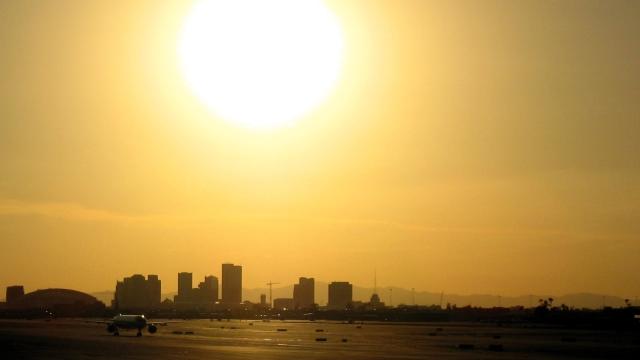If the past year of floods, fires, heat waves and droughts are any indicator, climate change is going to be rough. But in case you weren’t already alarmed, a team of prominent climate scientists has penned a paper warning that just 2C of human-caused warming could send us spiralling toward a “hothouse Earth” — one that’s up to 5C warmer with sea levels tens of metres higher than present-day.
It’s an awful, apocalyptic scenario. But how likely is it to occur, and at what temperature threshold? That remains to be seen.
The new paper is a literature review that doesn’t try to pin down probabilities, and its suggestion that 2C of warming — the goal set forth in the Paris Agreement just a few years ago — might be enough to send us careening toward much hotter world is just a hypothesis. Mostly, it serves as a reminder that catastrophic cascades are within the realm of possibility.
The authors, from the Stockholm Resilience Center, the Australian National University and elsewhere, looked at dozens of studies to understand how components of the Earth system have behaved during the climate swings of the past 1.2 million years. They found that the planet has never really had a long period in which the climate remained “stable” at 2C above pre-industrial temperatures.
“That raised alarm bells because all of our assumptions regarding the Paris Agreement and controlling climate change are based on the idea that if we ‘just’ stop emitting CO2 to the atmosphere, the processes causing climate change will stop and the climate will remain stable,” study co-author Katharine Richardson of the University of Copenhagen told us.
While the authors don’t go so far as to say 2C is a point of no return, they argue that at some threshold, we’ll set off a cascading series of tipping points that prevent the climate from stabilising.
For instance, a massive thaw-out of northern permafrost soils, or the dieback of a large portion of the Amazon due to climate-induced drought, could create a huge new source of planet-warming carbon emissions.
More speculatively, accelerated melting of the Greenland ice sheet could disrupt a key Atlantic ocean conveyor belt, resulting in heat build-up in the Southern Ocean that ultimately causes East Antarctica’s ice to destabilise over many centuries.
Penn State climate scientist Michael Mann warned that the paper makes a number of subjective calls.
“[T]here’s a role for that in the literature,” he said. “But in many cases it is as much in the domain of ‘opinion’ as ‘established fact’.”
Saying that, many scientists we contacted found the scientists’ perspective compelling.
“[F]rom a geological point of view, the case made in this paper seems (all too) reasonable and plausible,” Jan Zalasiewciz, a paleobiologist at the University of Leicester who studies past climate change, told us. Ecosystem ecologist Joshua Schimel of the University of California Santa Barbara agreed, noting that much of what the authors proposed felt “important and on target”.
“The really interesting argument is that there may be ways of avoiding the full blast of the full positive-feedback-driven warmer earth scenario,” Schimel said. “Can we limit the effect of runaway climate warming until we can find ways to start some of those feedback mechanisms running back the other way?”
Study co-author Johan Rockström of the Stockholm Resilience Centre told us he hoped the paper would “raise a debate that will lead to more research”, especially on the risks of cascades between various tipping elements.
“We simply do not have the analysis in place yet to know more precisely what systems tip when, and what carbon bursts they will generate,” he said.
But papers such as this are as much a call to action as they are a call for further study. As University of Minnesota climate scientist Jessica Hellmann put it, the possibility that a point of no return could be close at hand “should get the attention of every citizen, business person and politician around the world”.
“[T]here are now abundant scientific assessments showing substantial climate risk for people and other living creatures,” Hellmann said. “As a scientist, I find myself continually wondering: How much more synthesis and good evidence do we need to cause society to take this issue seriously?”
